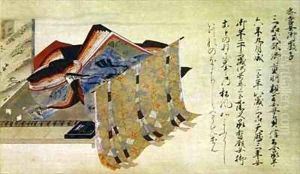Nobuzane Fujiwara Paintings
Nobuzane Fujiwara, also known as Fujiwara no Nobuzane, was a Japanese artist and a member of the Fujiwara clan, a powerful family that dominated the political scene in Japan during the Heian and Kamakura periods. Nobuzane was born around 1176, during a time when the Fujiwara family was heavily involved in the governance of Japan, though their influence was beginning to wane with the rise of the samurai class.
Nobuzane is best known for his work in the traditional Japanese painting genre known as 'yamato-e,' which focused on Japanese subject matter and themes, often depicting the court life and stories from Japanese literature. He was particularly adept at portraiture, creating likenesses that were not only elegant and refined but also included subtle psychological depth, capturing the character and status of the individuals portrayed.
During his lifetime, Nobuzane served as an official painter to the imperial court, a prestigious position that allowed him to work on a variety of commissions and contribute to the preservation and development of yamato-e. He was active during the early Kamakura period, a time when the political power was shifting from the court nobility to the military class. Despite these changes, the cultural and artistic traditions of the Heian court, where the Fujiwara family had previously held sway, continued to be honored and maintained.
Nobuzane was instrumental in the creation of the 'nise-e' ('likeness pictures') style of portraiture, which aimed to produce realistic and individualized depictions of its subjects. His portraits are considered some of the finest examples of Kamakura period art, blending a courtly aesthetic with a new level of realism. This combination would influence Japanese portraiture for generations to come.
The exact date of Nobuzane's death is not known, but it is believed that he lived a long life, passing away around the age of 90 in approximately 1266. His legacy includes not only his own works but also the influence he exerted on the development of Japanese art through his role as a teacher and mentor to younger artists. Nobuzane's descendants and students continued the traditions he upheld, making the Fujiwara family name synonymous not just with political power but also with cultural and artistic excellence in Japan.
